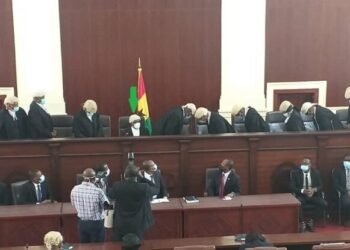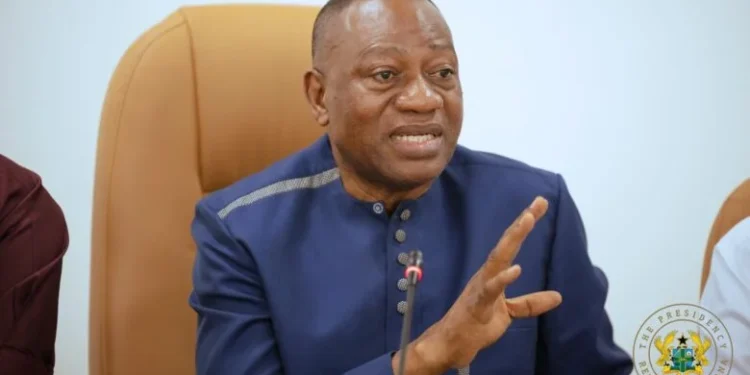The Aircraft Accident and Incident Investigation and Prevention Bureau (AIB Ghana) has assured the public of a thorough and evidence-based investigation into the recent military helicopter crash, stressing that the process will be guided by professionalism, transparency, and international standards.
At a press briefing in Accra, the Commissioner of AIB Ghana, John Mmeb Kunyan Wumborti, emphasized that the bureau, though part of the aviation sector, operates as an autonomous institution distinct from the Ghana Civil Aviation Authority.
This independence, he explained, is crucial because the bureau is mandated to investigate occurrences within the aviation industry—including matters that may involve other regulatory agencies.
“We are in the aviation industry, but we are an autonomous and independent organization. We are not part of the Ghana Civil Aviation because we are to investigate what they do and so we are an autonomous and separate institution”.
Commissioner of AIB Ghana, John Mmeb Kunyan Wumborti
He clarified that ordinarily, AIB Ghana does not investigate military aircraft accidents, unless specifically invited to do so by the relevant authorities. In this case, he said, the Bureau was called upon to contribute its expertise to the probe.
“This particular one, AIB Ghana, is part of the investigation because we’ve been invited to use our expertise,” he said, adding that he had already tasked a technical team led by Captain Fodjour, a retired pilot, and Engineer Ebusi, an experienced aviation engineer, to support the work of the investigative board.
Caution Against Speculations
The helicopter crash, which involved a Z9 aircraft belonging to the Ghana Armed Forces, has generated significant public concern, with widespread speculation about possible causes. But Mr. Mborti cautioned against drawing premature conclusions, stressing that aviation investigations rely strictly on verifiable evidence.
“I like the word speculate. We are professionals. We don’t speculate. What we do is that when there’s an occurrence, we go to the field. We use evidence, which we call factual information. Based on that, we verify the data we have, and it is only after that that we will know what happened”.
Commissioner of AIB Ghana, John Mmeb Kunyan Wumborti
Responding to questions on the scope of the investigation, he said AIB Ghana and its partners would adhere to established international protocols. “We have our standards that we follow. The protocol and the standard we follow, you know, we use them when we start the investigation. We will not be able to say, oh, we do this, we do this. We are using those protocols and the standard to do the investigation,” he said.
The Commissioner also addressed broader concerns about accountability and how investigation outcomes translate into safety improvements. He underscored that AIB Ghana’s recommendations are not about blame or criminal liability but about preventing recurrence.
“When an accident occurs and we go ahead to do our investigations, after the investigation, we make recommendations. And these recommendations, as I said, are not to apportion blame. We do that so that we correct, so that we don’t have any future occurrences”.
Commissioner of AIB Ghana, John Mmeb Kunyan Wumborti
He added that the bureau closely monitors the implementation of its recommendations to ensure that safety lessons are applied. “The reason why we do the investigation is to correct whatever might have happened. And so we follow religiously to make sure that these things are implemented for safety,” Mr. Mborti said.
He dismissed suggestions that AIB Ghana has faced logistical challenges in enforcing its recommendations, noting that the bureau has not encountered such obstacles in past cases.
The investigative board, chaired by DCOP Abdul-Osman Razak, the National Security Coordinator, includes representatives from the Ghana Air Force as well as AIB Ghana.
The board is also receiving technical support from the United States, with visiting investigators from the U.S. Air Force contributing expertise. A preliminary investigation team was constituted on August 6, the day of the incident, to collect initial evidence, and its findings were submitted to the main board on August 25. The board has been given a 30-day mandate to complete its full inquiry.
The 2012 crash at Kotoka International Airport, which claimed several lives, was cited during the briefing as the last major accident in the country’s aviation history. Journalists questioned how lessons from the current investigation would be translated into concrete reforms.
Mr. Mborti reiterated that the safety regime in Ghana has benefited from previous investigations, which is why aviation accidents remain rare despite frequent flights across the country.
“They are flying every minute in Ghana. But because of the recommendations that we make, that is where they correct all the mistakes that might have happened. That is why we don’t see more accidents happening”.
Commissioner of AIB Ghana, John Mmeb Kunyan Wumborti
As the investigation proceeds, the AIB Ghana has called for patience and restraint from the public and the media, urging all to await official findings rather than rely on speculation.
With international collaboration, experienced local investigators, and a clear commitment to transparency, the board hopes to provide answers that will not only clarify the circumstances of the crash but also strengthen aviation safety in Ghana going forward.
READ ALSO: NPA Builds Stakeholders’ Consensus on Draft Petroleum Bill























